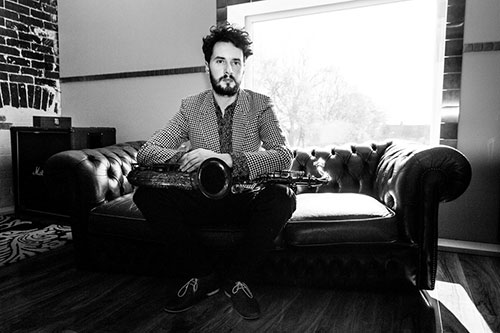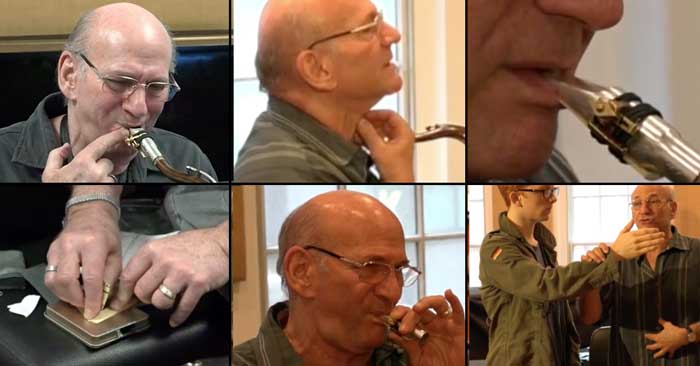Rising Sax Star Krzysztof Urbanski on Scales, Sound, and the State of Jazz Education
 Background
Background
There has been a lot of buzz around jazz saxophonist Krzysztof Urbanski. Krzysztof has participated in many jazz festivals, concerts, and competitions where he has consistently been awarded 1st place for his musical ability. Most recently Krzysztof became a Julius Keilwerth artist after placing 1st in the 2013 Saxophone Idol International Competition in Chicago, IL.
From listening to many new saxophone players, Krzysztof is by far in my opinion, one of the best young players on the scene and according to Herbie Hancock, Wayne Shorter, Jimmy Heath, and Kenny Burrell, one of the best in his generation.
I had the chance to interview Krzysztof and here are his comments in regards to his playing, ways for saxophonists to improve their playing, and his new album coming out this fall.
The Interview
ZACH: What material do you practice to further improve your current musical ability?
KU: I practice in many different ways and it depends on what I hear and what I have been influenced by recently. I write my own harmony structures and I play along with them to extend my own jazz vocabulary. I am still working on scales and chords, but to achieve a better understanding of each scale I go deeper into the scales. To be more specific, I am playing intervals and chords based on particular scales as well as passing notes (notes outside of the particular scale) to extend the amount of colors from each scale.
ZACH: In regards to developing your sound, what advice can you give to young saxophonists?
KU: I am still working on my sound, as it is the most important factor to me. I want to achieve the ability to be more of a vocalist rather than instrumentalist on my saxophone. At the end of the day, we are all trying to imitate a human voice. I keep concentrating on proper breathing and creating as much of a focused, intense and rounded sound as possible. Intensity is a huge part of my sound.
As additional advice, I would say that trying different horns will give you a better understanding of your own sound. I used to play my old Selmer Super Balanced Action, and I still love this horn. But I went through many saxophone brands and I ended up with this really great sax, Julius Keilwerth MKX.
Even though this sax is a modern, contemporary instrument I can still create my own sound based on my originality. In regards to my new saxophone, I can tell that this is the first instrument that allows me to speak in my original voice.
ZACH: When you teach a master class, what topics do you discuss with young players?
KU: That’s a very difficult question just because I think the jazz community in general is doing very well. Our jazz society is constantly growing and colleges are creating really interesting programs for the students. I would just add one important aspect, in my opinion. I think that our generation is more focused on the past than what is going on today. Jazz used to be an art form where musicians could express their originality and creativity. Of course, I have been brought up on Jazz traditions and love it, without it my playing and everything that I do in music wouldn’t be very valuable. Jazz vocabulary and the history of the music are really important and help us to completely understand the beauty of jazz. But as I’ve mentioned before, it is very important to keep jazz fresh in terms of everything that surrounds us, sound, electronics, the digital generation of listeners. I remember Miles Davis saying that even a car accident sounded different in 90’s than in 50’s, and he knew that all these aspects of modern lifestyle would change the sound of today’s Jazz.
ZACH: Who did you study saxophone with as you progressed to the career you have today?
KU: My very first saxophone teacher was Wladyslaw Chwin in Poland. I studied classical music with him at the Artistic school of music in Gdansk – Wrzeszcz . He helped me a lot and just because he didn’t play saxophone during our lessons, he opened my imagination. The fact that I have experienced the whole spectrum of the classical music was very helpful for me to develop my technique and the sound of my instrument.
I also studied saxophone with my heroes including Joe Henderson, John Coltrane, Cannonball Adderley, Dewey Redman, Charlie Parker, Joe Lovano, Michael Brecker, Sonny Stitt, Wayne Shorter and Kenny Garrett. I didn’t meet these gentlemen but they were a massive influence on my life and my music. I studied saxophone with trumpeters and pianists. I have always wanted to be musician not only a saxophonist. I didn’t want to be limited to just the saxophone’s possibilities.
ZACH: If you could change or add one aspect to jazz education being taught at the college level, what would it be?
KU: It depends on the level of musicians I talk to. I am trying to be flexible and adaptable enough to share the most relevant subjects with my students. I think the most important aspect is sound, as it is our identity. Through the sound we can express ourselves, we can share our thoughts and feelings. The sound of the instrument should be an extension of our voice. So that’s why it takes such a long time to develop it. Of course I focus on jazz harmony, jazz vocabulary as well as technical issues like articulation, correct breathing, and all of the other aspects of great saxophone playing.
ZACH: Do you have any C.D.’s or projects coming up soon?
KU: I have just recorded my new album, which is called Urban Jazz Society History of Tomorrow. It is available now on iTunes. It is completely original and very personal music which I am very proud of. I have started to collaborate with some of the most innovative musicians in the UK. This record is the way I hear music. I want to play music that makes people feel good, music that touches people in an emotional way that words can’t. This is what my album is all about.
My goal is to create a fresh and honest sound of our generation, to keep jazz cool and at the same time push jazz forward. Because everything is always changing, my goal is to keep jazz as an art form that is still alive. As a result, jazz is in a continuous state of innovation and development. I want to grow as an instrumentalist and also as an improviser, but the main goal to me is to create my own voice as a composer. John Coltrane, for example, didn’t just have an individual approach to the saxophone, but his method of composition made him so unique and original. I would like to keep improving my sound and the sound of my band, as it is the most important factor to me.
Equipment
- Saxophone: Julius Keilwerth MKX tenor saxophone
- Mouthpiece: Bari Hard Rubber 8/ Kell Geometric 1950′ 7## refaced by Morgan Fry
- Ligature: Francois Louis
- Reeds: La Voz Hard
More about Krzysztof
Krzysztof Urbanski’s Website
http://krzysztofurbanski.com
Performing Giant Steps
New track off the album





